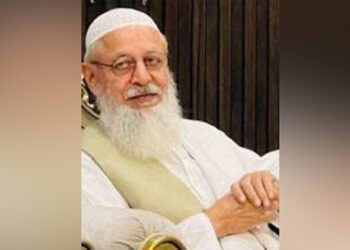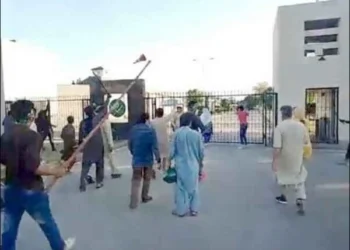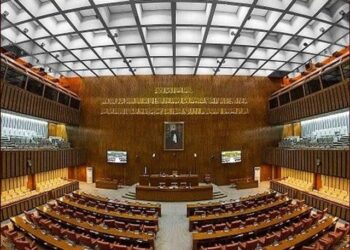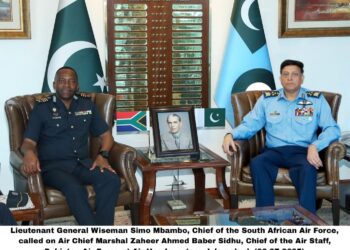Lashkar-e-Islam’s founder, Mufti Munir Shakir, was killed in a bombing in Peshawar. Examine his life, influence, and tragic passing.
Early Life and Education:
On April 4, 1969, Mufti Munir Shakir was born in Makhai Zai, Kurram Agency, Pakistan. He showed a strong interest in religious studies at an early age and committed himself to learning about Islam. He started his schooling at Government High School Makhai Zai before moving to Karachi and enrolling at Jamia Al-Binori Town.
Mufti Munir Shakir expanded his knowledge of religious doctrine under the guidance of Allama Banuri, a renowned Islamic scholar. At Jamia Darul Uloom Karachi, where he excelled in the Alimiyya course and established himself as a committed and learned person, his pursuit of knowledge continued.
Contributions to Islamic Scholarship:
Through his publications and sermons, Mufti Munir Shakir made a significant contribution to Islamic knowledge outside formal education. He gained a devoted following as a result of his teachings and interpretations of Islamic jurisprudence, but his extreme beliefs also caused debate among religious authorities.
Establishment of Religious Institutions:
Apart from his academic efforts, Mufti Munir Shakir was instrumental in the spread of religion. He founded the Jamia Masjid Nidaye Quran in Ormar, Peshawar, where he taught classes in Tafseer and the interpretation of the Quran. His impact in the area grew even more as a result of the large number of students and followers his teaching approach attracted. He aimed to inculcate in his disciples a more stringent view of Islamic law through his religious endeavours.
Formation of Lashkar-e-Islam:
In 2004, Mufti Munir Shakir founded Lashkar-e-Islam (LeI) in Khyber Agency, initially positioning it as an anti-crime group that aimed to enforce a strict interpretation of Islamic law. However, over time, the organization transformed into a militant faction that engaged in armed conflicts with rival groups and Pakistani security forces. As LeI’s activities intensified, the Pakistani government officially banned the group in 2008 due to its involvement in militant operations.
Disputable Instruction and Expulsion:
Mufti Munir Shakir first gained public attention after relocating to Bara Tehsil in Khyber Agency, where he established an FM pirate radio station. Through this platform, he promoted his strict religious beliefs, which were rooted in Deobandi theology. One of his most controversial pronouncements was his claim that opium was permissible (halal) if produced and used for medicinal purposes. His radical views and growing influence led to tensions with local tribal elders, ultimately resulting in his expulsion from Kurram Agency in 2004 due to escalating sectarian conflicts.
Rivalry with Pir Saifur Rahman:
Mufti Munir Shakir’s dispute with Pir Saifur Rahman, a Barelvi scholar who had immigrated from Afghanistan in the 1980s and lived in Khyber Agency, was a pivotal period in his life. An intellectual and sectarian dispute resulted from the two clerics starting rival FM radio stations to spread their respective religious philosophies. There was a significant disturbance in the area as a result of their rivalry turning into violent altercations amongst their supporters.
A tribal Jirga stepped in and ordered both clergy to leave the area in 2006. Mufti Munir Shakir first objected before being ejected by local tribal leaders, but Pir Saifur Rahman obeyed the ruling. He named Mangal Bagh, a former local transporter, as his successor in Lashkar-e-Islam before his departure.
Lashkar-e-Islam’s Militant Activities:
Under Mangal Bagh’s leadership, Lashkar-e-Islam grew into a powerful militant group, engaging in numerous armed conflicts with rival factions and Pakistani security forces. The group became infamous for enforcing its strict interpretation of Islamic law through violent means, including kidnappings, extortion, and armed confrontations.
Due to these activities, the Pakistani government officially banned Lashkar-e-Islam in 2008, labelling it a terrorist organization. Despite his physical absence, Mufti Munir Shakir’s ideological influence remained a driving force behind the group’s operations.
Peshawar Blast and His Death:
On March 15, 2025, Mufti Munir Shakir was critically injured in a bomb blast outside a mosque in the Ormar area of Peshawar. The explosion, which occurred just before Iftar, also injured three others Khushhal, Abid and Syed Nabi who were immediately rushed to Lady Reading Hospital for treatment. Despite the medical team’s efforts, Mufti Munir Shakir succumbed to his injuries.
Following the attack, security agencies, including the Bomb Disposal Unit (BDU) and Counter Terrorism Department (CTD), launched an investigation to determine the cause and perpetrators behind the explosion. The attack underscored the volatile security situation in the region, where religious figures with militant affiliations remained high-profile targets.
Reaction to His Death:
The death of Mufti Munir Shakir elicited mixed reactions. While his followers mourned his passing and viewed him as a martyr, others saw his demise as the end of a turbulent chapter in Pakistan’s history. Khyber Pakhtunkhwa’s Health Advisor, Ihtisham Ali, expressed deep sorrow over his death, calling it an irreparable loss. Meanwhile, security experts emphasized the need to continue efforts against extremism to prevent further instability in the region.
Legacy and Impact:
The passing of Mufti Munir Shakir signalled the end of a contentious but significant period in Pakistan’s militant and religious history. There is still controversy around his life and actions. Although he gained a devoted following for his contributions to Islamic teachings, his links to sectarian militancy and violence portrayed him as a controversial figure.
The socio-political dynamics of Khyber Agency were significantly shaped by his involvement in the founding of Lashkar-e-Islam. The region is still affected by the militant actions of LeI, which have left a deep mark. His legacy’s lasting significance is demonstrated by the fact that his beliefs and teachings still have an impact on local organizations.
Conclusion:
The ascent and decline of Mufti Munir Shakir offer a case study of how religious ideology, militant action, and local power conflicts intertwine. His capacity to inspire people via religious discourse serves as an example of the powerful impact that clerical leadership may have in tribal regions. Nonetheless, his participation in sectarian strife and militancy exacerbated the persistent instability in northwest Pakistan.
Although he no longer had direct power, the ideological conflicts he sparked are still going strong. The lessons learned from his life serve as a reminder of the complexity surrounding religious leadership and militancy as Pakistan continues its battle against extremism. To prevent history from repeating, governments and religious leaders alike must continue to address the underlying causes of such extremism.

























